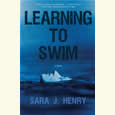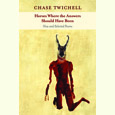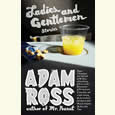Blood on the Tracks
Colson Whitehead constructs an alternate route out of American slavery in The Underground Railroad
“She envisioned two outcomes: a contented, hard-won life in a northern city, or death.” She is Cora, a young woman born into slavery, for whom there is little to call her own between these two possibilities. Colson Whitehead’s staggering, haunted new novel, The Underground Railroad, tells her story. It’s a book that is fully expected to win all the awards this year—Pulitzer Prize, Booker Prize, National Book Award, etc.—and it deserves every last one.
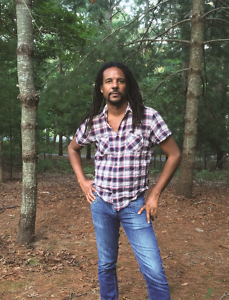
Cora’s story unfolds inside the heavily patrolled borders of an antebellum South that is at once unrecognizable in the barbarity of its customs—or at any rate, in the customary nature of its barbarity—and terrifyingly resonant. Cora travels toward freedom on an Underground Railroad that Whitehead has rendered literal: tunnels chopped and scraped through the earth, locomotives and rickety box cars, stations hidden below kitchen-floor trap doors but never far from peril.
If The Underground Railroad were a television show, it would have a black box emblazoned on its cover with alphabetic codes to warn readers about the language and violence contained in its pages. None of these notices would suffice to prepare a reader for the brutality of the book’s opening sections. Before she can even dream that freedom in the North could exist for her, Cora has to survive life, such as it is, on a cotton plantation in Georgia. Its owner, Terrance Randall, possesses, as the infamous slave catcher Ridgeway describes it, an “ornate” imagination when it comes to discipline.
To render this violent world palpable, Whitehead deploys an imagination every bit as ornate as Randall’s. But the resulting vision is prismatic and wide, even when circumstances reduce its characters’ motivations to the narrowest concerns: escape, punishment, survival, capture. Whitehead can see the light seeping through the cracks in this world, and in the fugitive hope that spurs Cora and her co-conspirators on. In the end, we are able to believe that, even in a world so disfigured and cruel, love can take hold—it has to. That is certainly nothing new in the world of novels, any more than the legacy of slavery is new to the American psyche. But what Whitehead achieves in The Underground Railroad is more than a reckoning with history; it’s a scale model of how much can be overcome, and how much remains to be dismantled.
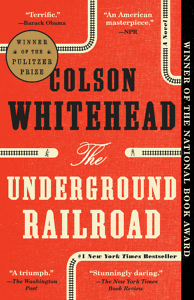 Whitehead answered a few questions from Chapter 16 via email:
Whitehead answered a few questions from Chapter 16 via email:
Chapter 16: The narrator in The Underground Railroad is omniscient throughout but at times hovers very close to a particular character’s perspective. We’re unaware that we’re walking through a certain sort of logic—one whose conclusions we might disagree with—until we’ve already followed along on its premise for a bit. We become almost complicit. Can you talk about your own ideas about how the narrator’s voice functions?
Whitehead: The narrator warps and bends toward each character’s consciousness, and if it works the reader is indeed swept up into the character’s philosophy/worldview. But the narrator also explains the world, makes sardonic asides, and—in the case of Cora’s fugitive-slave ad, for example—grants a blessing from time to time. So, hopefully the narrator is doing its job but also breaking free of its instructions from time to time.
Chapter 16: By making the railroad a literal set of tracks, and by taking liberties with historical fact to get at a greater truth, it could be argued that you run the risk of interfering with our reckoning of that part of our national identity—especially given how difficult it can be getting certain people to grapple with the actual facts. Any response to that argument?
Whitehead: Well, I’m not responsible for how folks choose or choose not to reckon with our national identity, so it never occurred to me.
Chapter 16: In a speech to free men and women on the Valentin farm, the orator Elijah Lander calls the U.S. “a delusion, the grandest one of all.” America shouldn’t exist, he says, because “its foundations are murder, theft, and cruelty. Yet here we are.” Recently, NFL quarterback Colin Kaepernick refused to stand for the national anthem, a protest of systemic racism and police violence against communities of color. Do you see a future in which that contradiction—the “yet” in “yet here we are”—becomes any less sharp, or even disappears?
Whitehead: Not really, but I suppose I must allow that we do improve as a country by degrees, slow degrees, so perhaps it is conceivable in the distant future we will observe some progress.
Chapter 16: Home, the right-hand man of the slave catcher Ridgeway, is counterintuitively a young black man who is constantly jotting things down in his notebook. He’s a fascinating and vexing character. How did he come about? Was he based on anyone you came across in your research?
Whitehead: Homer’s gonna Homer. There are many odd corners in the master/slave relationship, as evident in the stories of freed slaves who stayed on to work for their masters for free, and in masters who claimed to love their slaves even as they tortured, raped, and brutalized them. Surely Homer and Ridgeway’s story is not so strange.…
Chapter 16: There’s an argument between the teachings of Christianity and the actual workings of the human world that runs through the book. If there is a God here, it’s an indifferent one, but at the same time, the “ghost tunnel” harbors the slightest hint of, if not the supernatural, exactly, then some other sort of force. And Homer, like his namesake, ends up in a kind of limbo. What, if anything, do you want readers to consider about any kind of power beyond human ingenuity and cruelty at work in the world of this novel?
Whitehead: Well, personally, I think human beings are on their own, with an occasional mystery sweeping in to make things strange, and perhaps I’ve installed that in the novel.
Chapter 16: Cora has a deeply conflicted relationship with music; at one point, she thinks to herself of a particular song: “How could such a bitter thing become a means of pleasure?” In the acknowledgments you mention some of the music you were writing to, including Misfits—a band I also love but whose brand of horror has always seemed kind of campy. What was it like to listen to a band with an album called Legacy of Brutality while writing, in excruciating detail, about an actual legacy of brutality?
Whitehead: I listen to a loop of 2,000-plus songs when I work, stuff I like, and it goes from Kraftwerk to Stevie Wonder to Minor Threat to Funkadelic, and I never make a connection between the work and music except when Peggy Lee’s “Is That All There Is?” comes on.
[This article appeared originally on September 14, 2016. It has been updated to reflect new event information.]

Steve Haruch lives in Nashville. His writing has appeared at NPR’s Code Switch, The New York Times, and the Nashville Scene, where is he is a contributing editor.

